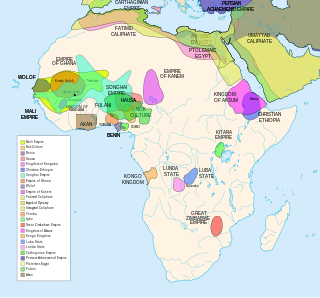
The Scramble for Africa was the conquest and colonisation of most of Africa by seven Western European powers driven by the Second Industrial Revolution during the era of "New Imperialism" (1833–1914): Belgium, France, Germany, Great Britain, Italy, Portugal and Spain.

Frederick John Dealtry Lugard, 1st Baron Lugard, known as Sir Frederick Lugard between 1901 and 1928, was a British soldier, mercenary, explorer of Africa and a colonial administrator. He was Governor of Hong Kong (1907–1912), the last Governor of Southern Nigeria Protectorate (1912–1914), the first High Commissioner (1900–1906) and last Governor (1912–1914) of Northern Nigeria Protectorate and the first Governor-General of Nigeria (1914–1919).
A gatekeeper is a person who controls access to something.
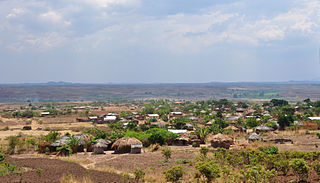
The earliest humans were hunter gatherers who were living in small, family groupings. Even then there was considerable trade that could cover long distances. Archaeologists have found that evidence of trade in luxury items like precious metals and shells across the entirety of the continent.

Indirect rule was a system of governance used by imperial powers to control parts of their empires. This was particularly used by colonial empires like the British Empire to control their possessions in Africa and Asia, which was done through pre-existing indigenous power structures. Indirect rule was used by various colonial rulers such as: the French in Algeria and Tunisia, the Dutch in the East Indies, the Portuguese in Angola and Mozambique and the Belgians in Rwanda and Burundi. These dependencies were often called "protectorates" or "trucial states".
Frederick Cooper is an American historian who specializes in colonialization, decolonialization, and African history. From 1974 to 1982 he was Assistant, then Associate Professor at Harvard University. Becoming Professor of History at the University of Michigan in 1982, he left for a professorship of history at New York University where he has worked since 2002.

Gatekeeping is the process through which information is filtered for dissemination, whether for publication, broadcasting, the Internet, or some other mode of communication. The academic theory of gatekeeping may be found in multiple fields of study, including communication studies, journalism, political science, and sociology. Gatekeeping originally focused on the mass media with its few-to-many dynamic. Currently, the gatekeeping theory also addresses face-to-face communication and the many-to-many dynamic inherent on the Internet. Social psychologist Kurt Lewin first instituted Gatekeeping theory in 1943. Gatekeeping occurs at all levels of the media structure—from a reporter deciding which sources are presented in a headline story to editors choosing which stories are printed or covered. Including, but not limited to, media outlet owner and advertisers.

Colonial Nigeria was ruled by the British Empire from the mid-nineteenth century until 1 October 1960 when Nigeria achieved independence. Britain annexed Lagos in 1861 and established the Oil River Protectorate in 1884. British influence in the Niger area increased gradually over the 19th century, but Britain did not effectively occupy the area until 1885. Other European powers acknowledged Britain's dominance over the area in the 1885 Berlin Conference.
Bitu or Bidu was a minor Mesopotamian god who served as the doorkeeper of the underworld. His name is Akkadian in origin, but he is present in Sumerian sources as well.
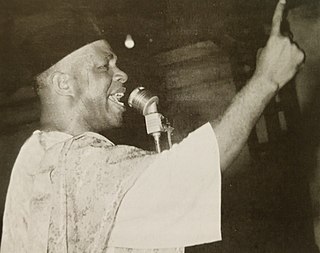
Kingsley Ozumba Mbadiwe (1915–1990) was a Nigerian nationalist, politician, statesman, and government minister in the Nigerian First Republic and a Biafran Roving ambassador during the civil war.

Kenneth Onwuka Dike was a Nigerian educationist, historian and the first Nigerian Vice-Chancellor of the nation's premier college, the University of Ibadan.
The Four Communes of Senegal were the four oldest colonial towns in French West Africa. In 1848 the Second Republic extended the rights of full French citizenship to the inhabitants of Saint-Louis, Dakar, Gorée, and Rufisque. While those who were born in these towns could technically enjoy all the rights of native French citizens, substantial legal and social barriers prevented the full exercise of these rights, especially by those seen by authorities as "full-blooded" Africans. Most of the African population of these towns were termed originaires: those Africans born into the commune, but who retained recourse to African and/or Islamic law. Those few Africans from the four communes who were able to pursue higher education and were willing to renounce their legal protections could "rise" to become termed Évolués (Evolved) and were nominally granted full French citizenship. Despite this legal framework, Évolués still faced substantial discrimination in Africa and the Metropole alike.

African empires is an umbrella term used in African studies to refer to a number of pre-colonial African kingdoms in Africa with multinational structures incorporating various populations and polities into a single entity, usually through conquest.
Politics of the belly, a translation of the French term politique du ventre, is a Cameroonian expression popularised by Jean-François Bayart in his 1989 book L'État en Afrique: La Politique du Ventre to describe African political power in the post-colonial era. It refers, in particular, to the relationship between patrimonialism, clientelism, corruption, and power. According to Lynn M. Thomas of the University of Washington:
The politics of the belly points to the propensity of politicians to hoard and greedily consume resources in things and people. In addition to highlighting the significance of idioms of eating and the belly to African conceptions of power, Bayart's analysis insists on the importance of vertical relationships – those between social unequals such as [...] patrons or clients – to understand African political history.
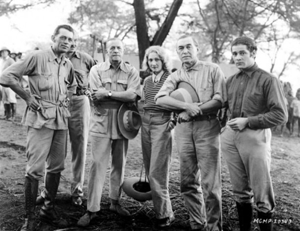
Sir William Frederick Gowers, KCMG was a British colonial administrator who was Governor of Uganda from 1925 to 1932.

Nigerian nationality law is regulated by the Constitution of Nigeria, as amended, and various international agreements to which the country is a signatory. These laws determine who is, or is eligible to be, a national of Nigeria. The legal means to acquire nationality, formal legal membership in a nation, differ from the domestic relationship of rights and obligations between a national and the nation, known as citizenship. Nationality describes the relationship of an individual to the state under international law, whereas citizenship is the domestic relationship of an individual within the nation. Commonwealth countries often use the terms nationality and citizenship as synonyms, despite their legal distinction and the fact that they are regulated by different governmental administrative bodies. Nigerian nationality is typically obtained under the principal of jus sanguinis, i.e. by birth to parents with Nigerian nationality. It can be granted to persons with an affiliation to the country, or to a permanent resident who has lived in the country for a given period of time through naturalisation.
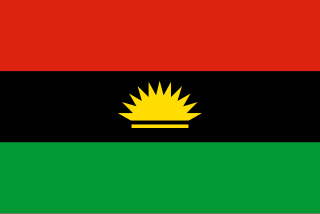
Igbo nationalism is a range of ethnic nationalist ideologies relating to the Igbo people of southeastern Nigeria. While the term is defined as seeking Igbo self-determination by some, others argue that it refers to the preservation and revival of Igbo culture and, for others, the development of Igboland stemming from the philosophy, Aku luo uno, which means "wealth builds the home".

Stephen Ellis was a British historian and Africanist whose research focused on post-colonial West Africa and South Africa. He was a former editor of Africa Confidential and African Affairs, a senior researcher at the African Studies Centre Leiden, and a professor at the Vrije Universiteit Amsterdam.

Nigerien nationality law is regulated by the Constitution of Niger, as amended; the Nigerien Nationality Code, and its revisions; and various international agreements to which the country is a signatory. These laws determine who is, or is eligible to be, a national of Niger. The legal means to acquire nationality, formal legal membership in a nation, differ from the domestic relationship of rights and obligations between a national and the nation, known as citizenship. Nationality describes the relationship of an individual to the state under international law, whereas citizenship is the domestic relationship of an individual within the nation. Nigerien nationality is typically obtained under the jus sanguinis, i.e. by birth in Niger or abroad to parents with Nigerien nationality. It can be granted to persons with an affiliation to the country, or to a permanent resident who has lived in the country for a given period of time through naturalization.
Welfare colonialism is a form of colonialism where investments by the colonizer in the native population, ostensibly intended to improve their quality of life, contribute to the dissolution of indigenous institutions thus perpetuating dependency and creating a permanent underclass. Though usage of the term dates from the 1950s, the concept is often associated with anthropologist Robert Paine, who expanded and developed it while observing the failed economic integration of the native population in Northern Canada.












